
Guide
Samsung, Honor and Google: a comparison of the best foldable phones of 2025
by Michelle Brändle

Siri, Alexa and Google Assistant have been on the scene for around seven years, so they should have learned a lot. I asked myself: can I use my smartphone for a whole day with only voice commands?
«Ok Google. What's the weather like today?»
It's about 6.30am. It's pitch-black in my bedroom, as it always is in winter when the days are short.
«Today in Zurich, it will be partially cloudy and between -4 and 0 degrees,» replies a female voice from my smartphone.
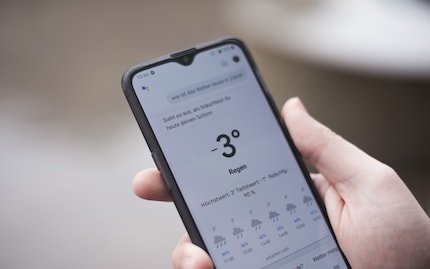
Right then. I'll get my money's worth out of my far-too-expensive winter coat. I ask the voice what's on the agenda today. An editorial meeting at 10am, then football training at 6pm. Otherwise, nothing. Just a normal, quiet Friday.
Then, in a far too friendly tone, the voice blasts out: «Goodbye». I smirk. I didn't know that virtual assistants needed to bid you adieu. Especially if it's just until later the same day, as my challenge was to use my smartphone for a whole day exclusively via Google Assistant.
I used to find it strange to ask my phone out loud whether I needed an umbrella that day. Still, smartphones and the advent of 3G networks have long enabled us to search for information quickly and easily. These days, I don't find talking to my phone as bad.
It all started in October 2011 when Apple brought Siri onto the market. Apple users were now able to talk to their smartphones. But there wasn't a real person on the other end; it was a virtual assistant. Jackpot. It didn't take long for Microsoft to follow with Cortana, or Amazon with Echo, or Google with Google Assistant in 2016. Today, the topic of voice-controlled devices is on everyone's lips, especially «Ok Google».
«Ok Goo Goo» works too, as I found out
«Ok Google», I say, after I've rubbed the sleep from my eyes, «how do I get to Zurich Hardbrücke station by bus?»
The Assistant needs a whole second to think about it. Then: «The best option is the 7.22am Line 4 bus from Asp. That's around a five-minute walk from here. It will take around an hour and ten minutes in total, including two changes.»
Nope, too long. I would never make my meeting. Ridiculous.
«Okay Google. What's the fastest way to get to Zurich?»
Google: «The quickest route into Zurich is by car via the A1. The journey takes approximately 16 minutes with little traffic.»
That's better.
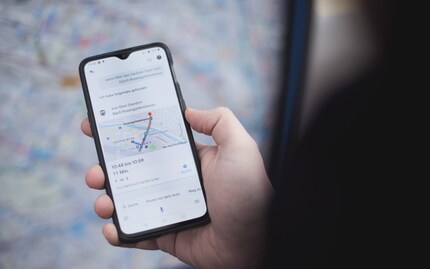
After my morning ritual of brushing my teeth, taking a shower and having a coffee – which was a little bitter today – I hop in the car. Now, music. I can't function without it. Music is my fuel.
«Hey Google» – I had just found out that «hey» works too – «play my Bohemian Rhapsody playlist.»
Bohemian Rhapsody by Queen has been my morning anthem for weeks and I can't resist passionately singing along. While waiting at traffic lights in front of Zurich's city gate, I wonder whether I'm making a good silent movie for the onlookers through my car window.
«Hey Google. Write a message to Dominik Natel,» I say in the car. My colleague Dominik Bärlocher is saved under this name in my contacts.
Queen automatically stops at «Hey Google». Otherwise, the microphone wouldn't be able to distinguish between my voice and the music. My command goes online as an audio file, then a server analyses the recording and carries out the instruction. If necessary, the server sends a spoken reply.
«Which messaging app would you like to use?» asks the friendly female voice. I respond with WhatsApp and begin to speak. I have to spell out punctuation like commas and full stops:
«Hey Dominik, full stop. It's funny to talk to you like this, comma, because I have to say punctuation out loud, full stop,» I say. And so on. And it actually works. Just try to stick to Hochdeutsch; Swiss German is still pretty unfathomable in other countries.
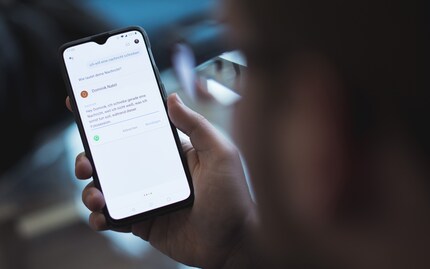
Still in the car, I realised: Google Assistant makes my life safer. Instead of fiddling around with my smartphone while driving, I can control it with my voice.
I don't send a lot of messages on this particular Friday. We have an open-plan office, and chattering away in Hochdeutsch is getting on my nerves anyway. What does work well, though, is setting reminders and adding dates to my calendar.
While I'm on the subject of reminders, I also take the opportunity to add milk and butter to my shopping list. It's amazing to be able to add to your shopping list with just your voice. How many times have you thought «ugh, we've run out of butter, I'll have to write it down» and then promptly forgotten about it? It's happened to me a hundred times.
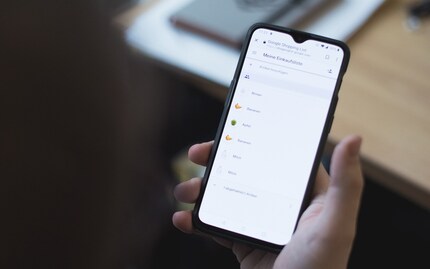
«Hola Google» – I try a creative foray into Spanish.
Nothing. Google Assistant only recognises «Ok Google» and «Hey Google» as activation codes. Some devices start their speech analysis with the click of a button. Others listen in constantly so that they never miss their cue. A key phrase like «Ok Google», «Alexa» or «Hey Siri» then starts the data transfer to the server.
Replying requires a lot of processing power, so it only works in the user's cloud. Otherwise, every smartphone, speaker and coffee machine would need to have the performance of a climate model-creating NASA computer.
Time to eat. I actually know exactly where I'm going to eat today: Angkor.
Nevertheless, I try: «Hey Google. I'm hungry». I want to test whether Google Assistant can find my favourite Asian eatery.
Not fast enough for my liking at 11.30am, Google Assistant reels off about a dozen nearby restaurant suggestions. Angkor isn't one of them. Pfft. I want to change that and ask something more specific.
«Ok Google,» I quietly repeat, «I want Asian food.»
A new voice replies, this time in Chinese, gabbling something unintelligible.
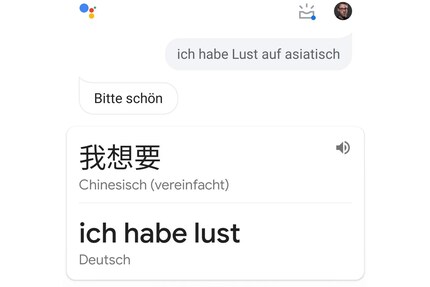
It turns out it means «I want» in Chinese. I finally figure it out. For Google, Asian is the same as Chinese. That makes me smile. But I still haven't got there. «Okay Google», I say with an exasperated sigh as things get serious, «do you know an Asian restaurant in the Puls 5 building?»
The Angkor restaurant comes up. Finally.
I wonder why it was so difficult. It's not like it's teeming with Asian restaurants here at digitec HQ.
Google Assistant communicates with the server online and checks my search query using its enormous database. This has a benefit: analysing and comparing thousands of voice commands from me and other users allows the Assistant to learn. This is useful because the system has now learned to understand more than just a few keywords or predetermined phrases.
I haven't known Angkor for long, but I expect that the more I go, the sooner Google will remember it. It's great, but creepy.
I have a telephone interview scheduled during the afternoon. I want to start the call via a voice command.
«Who would you like to call?» asks the female voice. At this point, I have to say the name of the person I want to call as it's saved in my contacts. Except, of course, I haven't saved the number.

«Erm, zero, seven, nine...,» I just read out the number instead. And it works.
Later, Dominik tries to call me. Good. This is the perfect opportunity to test whether I can accept calls via voice control. The answer: no. «Ok Google» gets no reaction. Instead, my phone just rings and rings until I have to accept the call by swiping across the screen.
Dominik and I often talk about privacy online. It's an important issue. You can deactivate Google's automatic voice control so that your smartphone stops listening for good. This is important if privacy is a big thing for you. However, this does mean that Google Assistant will no longer be able to follow voice commands when you say «Ok Google». But that's not too bad. You can activate the Google app by holding down the Home button on your smartphone.
There are voice-controlled assistants everywhere these days, not just on smartphones. Dominik says that his lights can be turned on and off via voice commands at home. With the Samsung Bixby, you can control household appliances such as washing machines, dishwashers and coffee machines, provided they're also Samsung models.
Google's partners include Philips Hue and Gigaset. In principle, all of these devices contain microphones, often in small, connected speakers. The concept is known as smart home, but as my house doesn't have the required infrastructure, I can't really put it to the test. Nevertheless, it's getting late and I'm hungry.
«Hey Google. Order a pizza via eat.ch,» I say.
«Alarm set,» answers the female voice.
Well, that was unexpected.
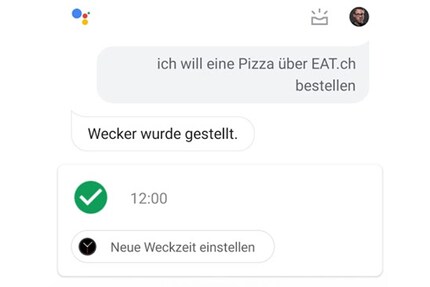
I turn off the alarm. After all, there's no need for it. My rumbling stomach could wake my girlfriend's pet tortoise from its hibernation.
«Open the eat.ch app,» I say. That works, I discover. One pizza later, I'm full and think I'll put an end to my experiment.

«Ok Google» is mostly practical for routine tasks: playing music, setting alarms and reminders, checking the weather. Google Assistant also understands more complex questions and doesn't just react to specific key phrases. If I ask Google about today's weather, I can just add «and tomorrow?» after its response to get the next day's forecast.
Unfortunately, the Assistant seems to rapidly flounder when it comes to more complex tasks. Especially in these parts. Unlike in the US, for example, Google Assistant can't yet book cinema tickets or reserve a table. Or order pizza. And an intelligent voice-controlled assistant like «Google Duplex», which can make a hairdresser appointment on its own, is definitely a long way off.
Google Duplex was announced in May 2018
Watch the video above to see how artificial intelligence imitates a human caller so well that the hairdresser on the other end of the call doesn't realise that she's just talked to a computer. It's becoming more and more covert.
But who exactly is the voice-controlled assistant designed for? For me, it's not yet smart enough for the tasks I want to set it. And Google offers a lot for people with visual impairments or restricted finger movement, but not enough. I can start a call with a command, but I can't accept incoming calls. I can set an alarm with my voice, but I can't turn it off. I can open an app by saying «Ok Google», but I can't close it and can rarely use it. And so on.

It's like the concept is only half thought-out. What a shame. But with the growing interest in smart home devices, I think voice control will become ever more sophisticated and popular on phones too.
I write about technology as if it were cinema, and about films as if they were real life. Between bits and blockbusters, I’m after stories that move people, not just generate clicks. And yes – sometimes I listen to film scores louder than I probably should.
Practical solutions for everyday problems with technology, household hacks and much more.
Show all